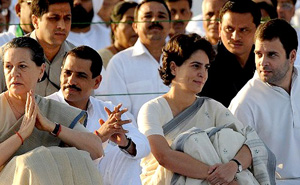New Delhi, Nov 2: Backing Robert Vadra, son-in-law of Sonia Gandhi, Congress today said "repeated hounding" of an individual is "not appropriate" and advised the media to avoid "unpleasantness" of shooting questions at private functions, like what happened to him.
Taking a step further, the party also highlighted Prime Minister Narendra Modi’s brush ins with the media and said the entire episode is being propagated as a "political agenda for obvious reasons" which cannot be considered either fair or proper.
"Indian Constitution and our established ethos guarantee Right of Privacy, personal space and liberty to all individuals, more so, when a person is neither in public life nor holds any public office.
"Unpleasantness of repeatedly asking questions at private functions, like what happened with Robert Vadra yesterday, must be avoided at all times," AICC spokesperson Randeep Singh Surjewala said.
He said that "repetitive hounding" of an individual on an issue that has been "conclusively rejected both by a Constitutional body like Election Commission of India as also High Courts and finally the Supreme Court of India is not appropriate".
Vadra had yesterday lost his cool and reportedly pushed aside the microphone of a reporter at a five-star hotel gym when he was quizzed about his controversial land deals in Haryana.
A livid Vadra was seen on a video footage shown on TV channels asking the reporter four times as to whether he was serious about his land deal question.
The Congress spokesperson said that while rejecting a Public Interest Litigation of a "BJP sympathizer" against Vadra, none less than the Supreme Court of India had said, "We won’t allow you to destroy someone’s reputation. Merely because someone is related to a politician, you cannot call him a sinner".
It is clear that entire episode is being propagated as a political agenda for obvious reasons which cannot be considered either fair or proper, Surjewala said in a statement released by the Congress.
"I want to remind leaders of BJP and friends of the media as to how none less than the current Prime Minister (the then Chief Minister) - Narendra Modi had removed the mike and walked out of a pre-fixed interview with leading journalist –Karan Thapar who questioned him about Gujarat riots".
He also mentioned the "shoddy treatment" meted out by Modi to two senior journalists when they had similarly questioned him about his role in Gujarat Riots.
On numerous occasions, fringe elements affiliated to BJP-RSS-Shiv Sena have attacked news media offices in Delhi and Mumbai without any reason or provocation, he said.





Comments
Add new comment